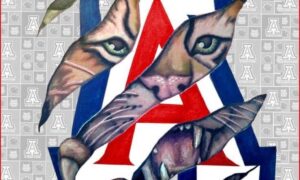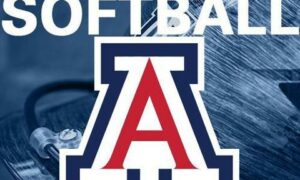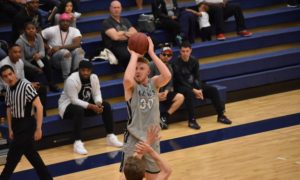(Tucson, AZ) Kim Doss
In a traditional sport, John Court has taken a unique path to become the head coach of the Arizona GymCats. Hailing from New England, he left his head coaching job at the University of Vermont two decades ago to become an assistant to longtime Arizona head coach Bill Ryden. When Ryden retired, Court stayed on as an assistant to Tabitha Yim. Only when Yim suddenly returned to coach her alma mater in the summer of 2017 did Court finally get a shot at the head coaching position. Even then, it was on an interim basis. Stabilizing a group that had seen three coaches in four years earned Court the permanent nod from Athletic Director Dave Heeke this March.
“Certainly, I understand the facts that sometimes people just need someone to give them a break, someone to give them a chance at a different opportunity,” Court said. “And I like those people, because I would say that I’m the wannabe that got to be.”
While Court was not an athlete prior to entering his coaching career, he did grow up around the sport. Both parents were coaches, but it is his mother, Jackie Court, whose role as a pioneer is best known in the world of college gymnastics.
The elder Court was the head coach at Brown University for 33 years before retiring to become a judge of the sport. She built the Brown program from the ground up, taking over a club sport in 1969 and creating a varsity program in 1971—a year before Title IX was passed. She is remembered as the first black coach of any sport at Brown, as well as an early advocate for women’s college sports.
Following in those footsteps, her son has become the only black head coach of gymnastics in a Power 5 conference. For a sport that’s predominantly white, rising to the position of a head coach is another unique achievement in the younger Court’s career. His parents didn’t demand that he follow in those footsteps, but they have been in his corner since he started down that path, and his mother’s resilience has influenced his own career.
“You know, she’s only kicked me out of the house three times,” Court joked. “She’s been a great influence. She’s never pushed coaching on me. Both my parents are coaches, my mother and my father. She worked at Brown University for all those years and she’s had some great success. And you talk about alums, there have been 40 years of alumni.

“It’s different. The Ivy League was different,” he continued, “and she’s certainly had her ups and downs and things like that. She always stayed the course, and she’s one tough lady. I get that from her, for sure. I think that she’s my biggest fan and my biggest critic. Like, if I’m chewing my gum too hard, I get a text when I get in the locker room, ‘Spit your gum out.’ I’m like, really? ‘Why did you choose that tie? Go get a haircut.’ So, there’s that motherly stuff.
“She came out for opening night last year. I said, ‘Your son has a job,’ so I bought her first-class tickets. Had her picked up in a Town Car, the whole nine yards. It was nice to be able to do that for her,” he said.
Court focused on a marketing degree at Johnson & Wales University, and earned his master’s degree in public/athletic administration at the University of Vermont. At the same time he was working on his degrees, he was starting his coaching career.
His mother may not have pushed him towards coaching, but she did offer him an opportunity when he decided it would be his career path. In fact, he took his first college coaching position as an assistant coach at Brown, spending two years on her staff.
Between his time at Brown and coming to Arizona, Court spent five years (1993-1998) at the University of Vermont when that university still offered varsity gymnastics. It was at Vermont that he first became a head coach, rising to the position in 1995 after spending two years as an assistant. He even got to face off against his mother while on the Catamounts’ coaching staff.
“We used to compete against each other, too. When I was at Vermont, she was at Brown,” Court said. “I probably ran my mouth a little more than I should, but I won the meet,” he joked. “She didn’t change the locks around the holidays, but…
“That was something. You don’t see a mother versus a son usually in an athletic competition,” he continued. “We had a few of those. We totally enjoyed it. Even our teams would get into it.”
In addition to his parents, Court said he has coaches all across the country who have helped him–not just those he has worked for, but those he has met at conferences or meets, those who coach gymnastics and those who coach other sports. In his 20 years at Arizona, he said that the supportive atmosphere in the athletic department enabled him to connect with great coaches who have done things no one else in their sports have.
“Those people, they’re all around the country. They’re in my family. They’re in this building, as well,” Court said. “I’ve been talking to Mike Candrea for the years I’ve been here, and some of the best conversations I used to have were…still with Mike, but with Frank Busch, as well. We were just sitting in the male coaches’ locker room, away from the public and everyone, sitting there like this after practice and just talking.”
Now, Court gets to put all that experience, mentorship and influence to work. With the “interim” tag removed, he was able to assemble his first Arizona staff and begin to institute his own vision for the program.
A major step in that process was hiring an assistant to fill out the coaching staff. He was looking for someone who was committed to the process of development and getting “down and dirty,” in Court’s words. He also wanted someone who was willing to speak her mind.
“Don’t hire someone who’s going to tell you what you want to hear,” Court said. “I don’t need that. I don’t need a lot of yes-folks. When you’re trying to hire people, don’t hire assistant coaches. Hire people who want to be head coaches.”

Arizona Assistant Gymnastics Coach Taylor Spears Photo courtesy of Arizona Athletics
Court found what he was looking for and went big by plucking Taylor Spears, a former national champion at the University of Oklahoma, off the staff of the University of North Carolina. Spears joins associate head coach David McCreary and the new director of operations, Tara Barrett, to complete the staff.
Spears’ success as an athlete on the biggest stage was important to Court. Recruits will see her as someone who understands what it takes for them to get to the highest level of collegiate gymnastics. Not only did her team win a national title, but she won individual titles both nationally and in the Big XII.
“She woke up every day and went to sleep every day for six years with the goal to win a national championship,” Court said.
While Spears only had one season coaching at UNC, she helped them improve their scores in the floor exercise, which was a weakness for Arizona last season. She started her collegiate coaching career as a volunteer assistant coach at Oklahoma, helping her alma mater to two more national team titles in 2016 and 2017. She also coached at the Bart Conner Gymnastics Academy in Norman, Oklahoma.
Not only did the search land the GymCats an assistant who will impress recruits, it also let Court know that the wider gymnastics community was interested in what’s happening at Arizona.
“Being able to look at a lot of candidates during the search process, it was very exciting to know that so many people are interested in coming to work at U of A, being involved in Arizona gymnastics,” he said. “Sometimes, you just don’t know, but to have that level of interest, I was very, very excited.”
The additional staff position that was filled by Barrett gives Court hope for the future, as well. The position had not previously existed, so he believes it shows a new level of support for the women’s programs from the administration.
Now leading a stable program with a proven staff and supportive administration, Court is ready to move forward. In part two of our interview with him, learn what’s on the horizon for the Arizona GymCats in the 2018-19 season and Coach Court’s vision for the long-term success of the program.















